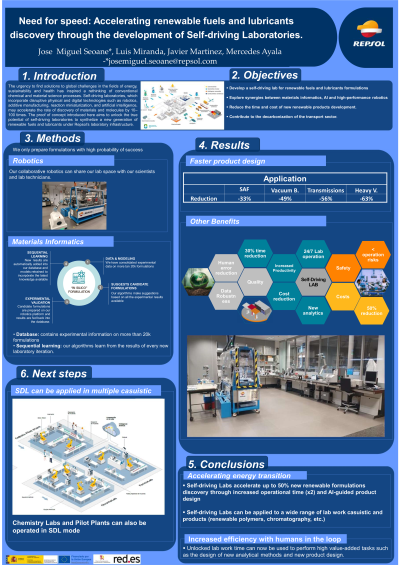Frontiers in Technology
Poster Session A
(1070-A) Need for speed: Accelerating low-carbon fuels and lubricants discovery through the development of Self-driving laboratories.
Tuesday, May 28, 2024
16:30 - 17:15 CEST
Location: Exhibit Hall


Jose Miguel Seoane, josemiguel.seoane@repsol.com (he/him/his)
Advisor
Repsol
Mostoles, Madrid, Spain
Poster Presenter(s)
Abstract: The urgency to find solutions to global challenges in the fields of energy, sustainability
and health has inspired a rethinking of conventional chemical and material science
processes. Self-driving laboratories, which incorporate disruptive physical and digital
technologies such as robotics, additive manufacturing, reaction miniaturization, and
artificial intelligence, may accelerate the rate of discovery of materials and molecules by
10–100 times. By using autonomous robotic experiment workflows, self-driving labs
allow access to much of the chemical universe and reduce discovery cycles by combining
AI sequential learning, optimizing experimental design to minimize experiments, and
automating analytical tests. The proof of concept introduced here bring this concept to
reality by implementing multiple advanced robotics elements together with IA assisted
experimental design and orchestration software technology to unlock the true potential of
self-driving laboratories under Repsol’s laboratory infrastructure. In particular, we have
set up an autonomous laboratory for the iterative design and testing of novel low-carbon
fuels and lubricants formulations with the aim to reduce by 50% our time to delivery.
and health has inspired a rethinking of conventional chemical and material science
processes. Self-driving laboratories, which incorporate disruptive physical and digital
technologies such as robotics, additive manufacturing, reaction miniaturization, and
artificial intelligence, may accelerate the rate of discovery of materials and molecules by
10–100 times. By using autonomous robotic experiment workflows, self-driving labs
allow access to much of the chemical universe and reduce discovery cycles by combining
AI sequential learning, optimizing experimental design to minimize experiments, and
automating analytical tests. The proof of concept introduced here bring this concept to
reality by implementing multiple advanced robotics elements together with IA assisted
experimental design and orchestration software technology to unlock the true potential of
self-driving laboratories under Repsol’s laboratory infrastructure. In particular, we have
set up an autonomous laboratory for the iterative design and testing of novel low-carbon
fuels and lubricants formulations with the aim to reduce by 50% our time to delivery.
